The UK Food Group’s 2011 autumn conference, The Food Producers, looked at the real questions of how small-scale production can respond to the challenges of providing food in ways that eradicate hunger, improve equity and restore the environment. It was held in the run up to World Food Day, on 27 September 2011 at Friends House in London.
Most food in the world is grown, raised and harvested by small-scale food producers. Through the framework of food sovereignty they have articulated their vision of how the multiple challenges facing food production can be met sustainably. In the wake of food riots, at a time of a devastating famine, and with growing recognition of the damage done by the industrial food system, we joined representatives of small-scale food producers — to discuss what we in the UK can do to support the food sovereignty model of production.
Downloads:
| Patrick Mulvany, UK Food Group Introduction including a tribute to Wangari Maathai, the environmental and political activist, who died a few days before the event. |
slides (pdf 0.3mb)
audio |
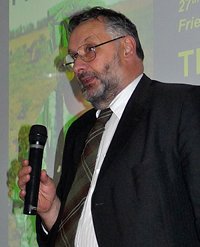 Norman Leask, Scottish Crofting Federation Norman Leask, Scottish Crofting FederationNorman Leask was brought up on a croft in Shetland where crofting became second nature for him. Initially he worked as an engineer, coming home every night to tend the animals. In 1977 he went full time to crofting (including salmon farming for several years). Since 2000 Norman and his wife have run a shop in Lerwick. Norman’s love is to rear Shetland sheep and Shetland cattle and produce ‘real’ food. Norman is on the board of the Scottish Crofting Federation where he is the Parliamentary Spokesman, and he represents the UK within Vía Campesina, the international peasant movement. |
slides (pdf 1.9mb)
audio |
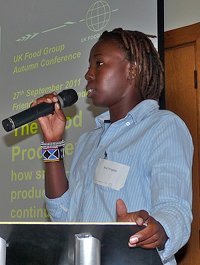 Ikal Angelei, Friends of Lake Turkana Ikal Angelei, Friends of Lake TurkanaIkal Angelei is a Turkana, from the pastoralist community of Northern Kenya and works on issues of environmental, resource and community rights. She has campaigned to stop the Gibe III hydro-electric dam, as well as doing advocacy on a range of issues affecting pastoralist societies from climate to indigenous people’s rights to animal health services. |
audio (11 mins, mp3, 1.3mb) |
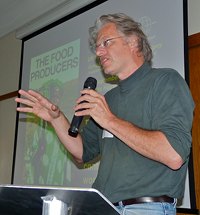 Nico Verhagen, Via Campesina Nico Verhagen, Via CampesinaNico Verhagen is part of the team of the International Secretariat of Vía Campesina, the international peasant movement. Before this, from 1990-1999, he was coordinator of the European Farmers Coordination (now called the European Coordination Vía Campesina). |
audio (24 mins, mp3, 2.9mb) |
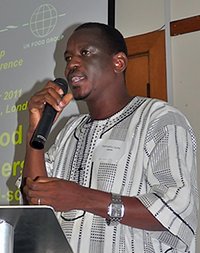 Mamadou Goïta, ROPPA Mamadou Goïta, ROPPAMamadou Goïta is a development socio-economist from Mali. He is currently the Executive Secretary of ROPPA (West African Network of Farmers’ Organisations). He serves on the boards and steering committees of several national and international NGOs and is also active in social movements; he was part of the coordination of both the Polycentric World Social Forum of Bamako in 2006 and the World Food Sovereignty Forum in 2007. For many years Mamadou has worked on issues of food sovereignty, cotton, trade, conflict resolution and migration. |
audio (18 mins, mp3, 2.1mb) |
Additional resources: Report from Nyéléni Europe 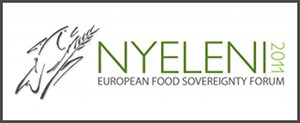 Nyéléni Europe 2011: European Forum for Food Sovereignty was a meeting of 400 people from 34 European countries from the Atlantic to the Urals and Caucasus, from the Arctic to the Mediterranean, joined by international representatives from diverse social movements and civil society organisations. They met from in August 2011 in Krems, Austria to take a step forward in the development of a European movement for food sovereignty. The delegation from the UK reported back to the UK Food Group. Nyéléni Europe 2011: European Forum for Food Sovereignty was a meeting of 400 people from 34 European countries from the Atlantic to the Urals and Caucasus, from the Arctic to the Mediterranean, joined by international representatives from diverse social movements and civil society organisations. They met from in August 2011 in Krems, Austria to take a step forward in the development of a European movement for food sovereignty. The delegation from the UK reported back to the UK Food Group. |
audio (12 mins, mp3, 1.5mb) |
